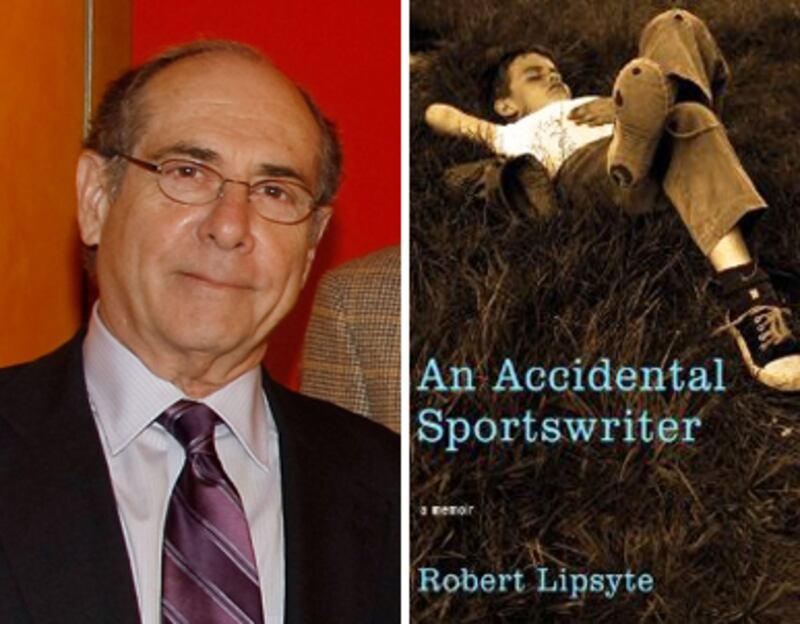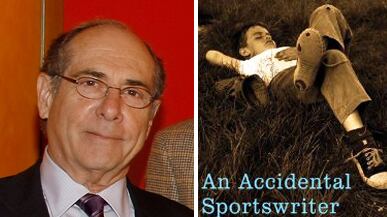When a young man on the make tells me he wants to be a sportswriter, I tell him to read one book. It's called SportsWorld by Robert Lipsyte. Starting next month, I'll tell him to read another: An Accidental Sportswriter, which is functionally Lipsyte's sequel. In sportswriting's cosmic baseball card set—Jimmy Cannon! Dan Jenkins! Charlie Pierce!—you can find men who wrote as pretty as the former New York Times columnist. But Bob is the five-tool sportswriter. His beat is the ballpark, the '60s, African-American history, women's lib, Muslim theology, sports as metaphor, and—most interesting for you, young sportswriter—the craft of sportswriting itself.

Lipsyte is the guy who makes us ask the pencil-stopping question: Are sportswriters wasting their careers?
Bob—a pal—is 73 now, with a pair of hearing aids and a strip of infield grass stubbornly clinging to the sides of his head. His voice gets positively gleeful when he's saying something counterintuitive, which he nearly always is. Lipsyte was born in Queens in 1938. He likes to say he went to exactly two baseball games as a kid, which he didn't much enjoy. He went to his next game as a New York Times reporter.
"I was as close to tabula rasa as a sportswriter can be," Lipsyte says. After he graduated from Columbia at 19, his plan was to pack off to California and write novels. But a summer job on a water truck fell apart. So Lipsyte answered an ad to be a copyboy at The New York Times. He was dispatched to the sports desk, where his first mentor was Gay Talese. It was like young Mike Tyson walking into the mountain lair of Cus D'Amato.
Talese, the New Journalism maestro, would send Lipsyte on cocoa runs. "I don't want hot chocolate, Bob," Talese would say, "that's powder and water. I want milk, and that is how you tell them it should be cooked." Lipsyte soon got bored. He told Talese he wanted to quit the paper. "Bob," Talese said, "I will give you $5,000 in exchange for 10 percent of your earnings as a freelance writer for the next 10 years." Lipsyte was floored that Talese would place that kind of bet on a young writer, and he stayed at the Times.
In An Accidental Sportswriter, he revisits Talese, now in his elegant, legend-buffing dotage. Lipsyte asks, "Is there any possibility you could have been kidding around?" "Sure," Talese replies.
No matter, at age 21, Lipsyte was off the bench and contributing features and sidebars. The Times sent him to cover the 1964 title fight between Cassius Clay and Sonny Liston, where he met the Beatles. ("Who were those little sissies?" Clay asked Lipsyte later.) When Clay held the world title aloft, Lipsyte saw in the gleam of the belt sports and '60s social upheaval and his own careerism. "I'm going to own this story," he remembers thinking. He still has the ideas he scribbled down on a notepad that night: "Muslims…Malcolm…Clay's early life in Louisville…"
"The infectious values and myths transmitted by bad sportswriters," Lipsyte once wrote, "may be the deadliest words in the paper."
Muhammad Ali was a vessel through which Lipsyte smuggled big ideas onto the sports page. Ali liked Lipsyte. They were just four years apart in age. Lipsyte was curious—the nice part about tabula rasa is you see everyone anew—and had co-written Dick Gregory's Nigger. Mostly, Lipsyte was patient. He could sit through the hours of comic doggerel, religious dogma, and old-guard sportswriters asking questions about the "moos-lums." Then, when Ali's jive began to bend toward something like truth, Lipsyte snatched those thoughts for his column. No less than Malcolm X told Lipsyte that his boxing writing was some of the fairest he had read anywhere.
As a sports columnist, Lipsyte was a swaggering sociologist. "Bob understood the difference between the owners and the players," says David Meggyesy, a dissident linebacker who became a favorite Lipsyte subject. Tabula rasa. Where writers compared Ali to an "unwashed punk" draft dodger, Lipsyte saw a renegade and comic genius. Jack Scott and Harry Edwards, troublemakers elsewhere, were in Lipsyte's column heroic figures trying to pull sports out of antiquity. Lipsyte wasn't a sports-hater (a badge back-page anarchist Leonard Shecter wore), but he lacked the innate streak of fandom we typically associate with a sportswriter. Lipsyte didn't want to be Phil Pepe. "I wanted to be Philip Roth!"
As a writer, Bob was "on the peninsula," his old Times sports editor Neil Amdur says. (He wasn't quite on the island—that was Hunter Thompson at the Kentucky Derby.) After a few years, the seasonal drone of sports began to wear on him, and fiction beckoned. After Joe Frazier beat Ali in 1971, Lipsyte quit the Times. One of my favorite bits of trivia is that kindly old Red Smith, the sportswriter readers once set their watches by, replaced Lipsyte at the paper. When he walked away from one of the most powerful perches in sportswriting, Bob was 33 years old.
It's not unheard of for a sports-page veteran (Stanley Woodward, Leonard Shecter) to produce a work that leaves burn marks on the profession. Stung by the poor reviews of his thriller Liberty Two, Lipsyte was lugging a bigger canister of dynamite. Taken together, SportsWorld (1975) and An Accidental Sportswriter are a sustained attack on the mythos encrusted on sports and the journalists who helped to maintain it.
SportsWorld, Lipsyte wrote, is a "dangerous and grotesque web of ethics and attitudes, an amorphous infrastructure that acts to contain our energies, divert our passions, and socialize us for work or war or depression." Moreover, it's a "pacifier, safety valve…a concentration camp for adolescents and an emotional Disneyland for their parents…a buffer, a DMZ, between people and the economic and political systems that direct their lives."
The sound you hear is Ken Burns' head exploding. And Lipsyte was just getting started. Baseball: "an incredibly complex contrivance that seems to have been created by a chauvinistic mathematician." College football: "America's grandest monument to national hypocrisy." Vince Lombardi was "football's frontman while it was promoting itself as a sadomasochistic weekly adventure show," and hallowed Halls of Fame were "eerie crypts." About the Mets: "It would take at least a grand jury to get at the origins of the New York Mets"—truer than ever in the Madoff Era.
The sportswriters—the older guys, especially—were co-conspirators, pumping up athletes even though they knew the truth. Their attitude, Lipsyte says, was, "We're all of the carnival, and the rubes"—aka, the readers—"are out there."
Lipsyte dug in the box and took his swings. On Grantland "Granny" Rice, the first celebrity sportswriter: "The writer who likens a ballplayer to Hercules or Grendel's mother is displaying the ultimate contempt—the ballplayer no longer exists as a person or a performer, but as an object, a piece of matter to be used, in this case, for the furtherance of the sportswriter's career... Rice populated the press boxes with lesser talents who insisted, like the old master, that they were just sunny fellows who loved kids' games and the jolly apes who played them."
More: "A sportswriter learns early that his readers are primarily interested in the affirmation of their faiths and prejudices, which are invariably based on previous erroneous reports."
Still more: "We were complicit in keeping women out of press boxes, much less locker rooms. … Women diminished the prestige of our tree house, the men-only access we gloated over to friends and neighbors."
Red Smith wrote the "the purest, most crystalline, most delightful fresh running prose in sports," but until late in his career Smith was "polishing the SportsWorld silver." Bob Costas, he of the perpetually unlined forehead, is "one of the Jock Culture's most treasured cheerleaders. … Just look how happy he seems bantering with those ex-athletes on pregame shows, a terrier playing with mastiffs and Great Danes."
"The infectious values and myths transmitted by bad sportswriters," Lipsyte wrote in SportsWorld, now rising to a crescendo, "may be the deadliest words in the paper." This wasn't just superb gun-slinging. It was, in the world of the pressbox, a crisis of faith. Lipsyte the sportswriter is like Cherry Jones in a nun's habit, standing center stage and yelling, "I have doubts!"
* * *
Don't you, too, young sportswriter? What's riveting about Lipsyte's indictment is that it rings as true in the age of ESPN as it did in the days of the New York World-Telegram and Sun. As the sports page has gone digital, its "free advertising" has tentacled out even further. Mock drafts. Predictions columns. Notes columns. Arguments about who gets the next crypt in the Hall of Fame. (Whoops, I did that.) The endless Horatio Alger profiles, which Lipsyte calls "quasi-racist features about fatherless delinquents who rose from ghetto hellholes to become vicious linebackers who, off the field, played bass guitar, surprised Mama with a house, and ran a foundation for kids they had been."
It's not that modern sportswriters lack passion. But what passes for transgressive sportswriting today is mostly hot-stove news, where writers truck in deep background sources, where "trade rumors" (few of which come true) are hard currency. I still think of the scene in Moneyball when Billy Beane calls up Peter Gammons, tells him a fib, and savors the idea of Gammons disseminating it to the rest of the league. In this scoop-driven context of no context, I'm not sure even Gammons thinks he did anything wrong.
Most sportswriters aren't noxious. They're adrift. They haven't solved Lipsyte's riddle, which is: What is a sportswriter supposed to do? (They may have been waylaid by another mystery: What do website-clicking sports fans want?) Without a compass, they become unwitting comic players—Jimmy Cannon's "vaudevillians of journalism"—or, worse, prove the enduring libel of the sports section as the "toy department." With exceptions like the Times' indomitable Alan Schwarz, Joe Posnanski, and a minyan of magazine writers, old-media sportswriters are as questing as when Lipsyte left them in 1971. "There are all kinds of sportswriters," he writes in his new book, "simply because we are not sure if we are supposed to be reporters, critics, analysts, investigators, fabulists, moralists, comics, or shills for the games that make us possible."
Lipsyte updates his media critique in An Accidental Sportswriter. The dyspepsia is right, but some of the particulars are off. He goes in for the easy metaphor that writers missing steroids in the 1990s was like writers missing Iraq's WMD. Only the print-the-legend naïveté is the same, and conflating a misdemeanor with a felony serves to make sports look like a far bigger deal than it is.
In An Accidental Sportswriter, Lipsyte pays too little attention to the rebel band that appeared on the sportswriting fringe and has effectively become the white-hot center of the industry. Commandant Daulerio at Deadspin is not invested in throwing garlands around the necks of pro athletes so much as putting plastic bags over their heads. Lipsyte sees fantasy sports as fans transferring onanistic energies from the players to management. "You're not jerking off to Warren Beatty anymore," he tells me. "You're jerking off to the studio head." OK, but I see fantasy as a Timothy Leary drop-out that Lipsyte should be proud of—the ultimate undermining of SportsWorld.
"Sports," Lipsyte writes in An Accidental Sportswriter, "has lost almost all its moral cachet and is accepted as a branch of the entertainment industry." Indeed, the Web's sportswriters treat sports like action movies: See the way that Bill Simmons toggles between a dissection of the Red Sox and a dissection of The Town. These new writers may rarely delve into the murky waters of race and politics and gender. But nor do they go for the dime-novel fabulism like Lipsyte's Times battery mate Arthur Daley. The new writers haven't inherited Lipsyte's moral muscle but they have inherited his hipness, his suspicion. Which is something.
Another way of saying this is that, these days, we may not know what kind of sportswriters we should be, but we know what kind we shouldn't. Proof comes from a wonderful scene in An Accidental Sportswriter in which Bob Costas takes Lipsyte to lunch. Bob C. always thought Bob L. was a sourpuss, too "corrosive." (Lipsyte wrote about Mickey Mantle's organ-transplant line-hopping while Costas was eulogizing The Mick into Mitch Albom's version of heaven.) Be happy, Costas had told Lipsyte, and your readers might like you more. Lipsyte: "I was flattered that he had taken the time to mentor me—he was 14 years younger…"
Costas says something revealing during that lunch: "Now, the prevailing tone [in the sports media] is so mean you have to play it straight. … There's more of a need to celebrate." On the one hand, this is self-serving jive, since Bob Costas is going to celebrate sports as surely as Chef Boyardee is going to celebrate ravioli. But on the other, what Costas calls a new "meanness" is really the kind of sportswriterly hard-headedness that Lipsyte pined for. A communal pirate spirit. A Lypsitism, flowering all over the blogosphere and beyond.
* * *
Though he raced away from the Times at 33, Lipsyte never managed to get away from sports. He interviewed Joe DiMaggio and Mickey Mantle for CBS News Sunday Morning and wrote several young adult novels about sports. His yellowing columns and features had a nice afterlife, too. When David Remnick wrote King of the World, his book about Muhammad Ali, he installed Lipsyte—not Red Smith—as the Greek chorus.
In 1991, Lipsyte began a second, 12-year tour as a New York Times sports columnist, his socially conscious ears twitching once again. He reported on gay athletes and learned to love NASCAR. He later materialized on ESPN.com's Page 2, John Walsh's magic cornfield where accidental sportswriters David Halberstam, Ralph Wiley, and Hunter Thompson showed up to take a few final swings. (Bill Simmons was Ray Kinsella, the young guy looking around in wide-eyed wonder.)
Today, young New York lit'ry people know the name Lipsyte because of Bob's son, Sam, a crack novelist—the career Bob set out for in 1957. That points to the hole in these memoirs. Lipsyte gave five decades to sports when he had (hell, has) the literary talent to write about anything. You can write about race and class and gender through the prism of sports, but you can also, you know, write about race and class and gender.
I almost wince when I ask him the question he taught me to ask myself: Is sportswriting worth it?
"I honestly don't know how to answer that question," Lipsyte begins. "I'm very happy with my life, particularly now. It's led me into a lot of wonderful places. I've gotten an enormous amount of pleasure writing the teenage books which are sports related."
"I do remember an emotional feeling on Election Nights, when for some reason or another I'd have to go into the paper. Everybody was wired into really momentous events in the life of the democracy. I was going back to, I don't know, check on a score in my column. There was always a lot of free food—great-looking sandwiches and coffee and buns. But I could never bring myself to take one. It was like I didn't deserve it."
"At 73, do I sometimes think, What am I going to do when I grow up? I really do. Maybe that's one of the reasons I get so much vicarious pleasure out of Sam's career, which is what I thought I would be doing."
I asked him why he kept returning to sportswriting when he'd so painstakingly documented its flaws. "Was it comfort? Was it fear? I sometimes thought I could make my will prevail as a sportswriter in ways I couldn't… I thought I would be free to say what I wanted to say."
He thought about his readers. "Sports journalism is probably the first portal into journalism for many people—younger readers, for sure. And the lies they are told probably will be longer lasting and more powerful. It's like getting steroids at a young age or getting concussed in peewee."
"I never stopped believing that sports is the most fun you have with your body in public," Lipsyte continues. "But this shit we're covering, it's not sports."
We may no longer go in for mythic junk like the Four Horsemen, young sportswriter, but we submit ourselves to other mythic structures, like a three-day, 16-hour televised NFL Draft. We confuse sports with a sportscast. There are still a whopping number of great stories to be written on the sports beat. But most of them must be delivered from on the peninsula, where Bob is standing, casting a rueful eye on the whole show. I'd like to call him the most important sportswriter of the 20th century. Bob convinced me that pompous declarations are for lesser mortals.
Plus: Check out Book Beast for more news on hot titles and authors and excerpts from the latest books.
Bryan Curtis is a national correspondent at The Daily Beast. He was a columnist at Play: The New York Times Sports Magazine, Slate, and Texas Monthly, and has written for GQ, Outside, and New York. Write him at bryan.curtis at thedailybeast.com.






